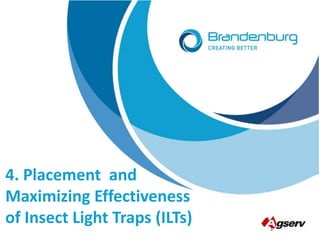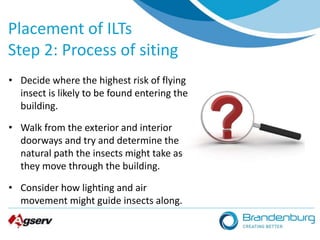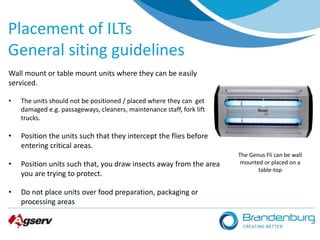Placement & Maximizing The Effect Of IL TS
- 1. 4. Placement and Maximizing Effectiveness of Insect Light Traps (ILTs)
- 2. Terms of Use This presentation and its contents (including text based content, images and photographs) are owned by Brandenburg UK Ltd. and protected under copyright laws. It is distributed without charge. You are granted permission to distribute it and use it for any purpose provided: ŌĆó You do not remove these terms of use. ŌĆó You do not make any other changes to the contents or layout. The information contained in this presentation is provided in good faith. However, Brandenburg UK Ltd will not be liable for any consequences whatsoever arising from its use. Any products referenced in this presentation are used for example only, and should not be construed as a positive or negative endorsement. Any products or techniques referenced in this presentation may be subject to local laws and regulations, and compliance with such is the sole responsibility of the viewer. ┬® Copyright Brandenburg UK Ltd.
- 3. Fly Trap Effectiveness Issues: Flying insect behaviour How flies behave: ŌĆó They fly near passageways ŌĆó At 18ŌĆØ above the floor ŌĆó Flies avoid hot, dry environments ŌĆó They hunt for food by day How do they navigate? ŌĆó Use UVA light to find way out of a building ŌĆó Move to another place to breed again ŌĆó Escape reaction
- 4. Fly Trap Effectiveness Issues: Maintaining equipment Replace consumables regularly: ŌĆó Control boards = every 4 weeks ŌĆó Bulbs = 12 months minimum replacement Keep units clean and free from debris: ŌĆó Service and clean on a regular basis for best performance Replace bulbs every 12 months for effective performance
- 5. Fly Trap Effectiveness Issues: Why replace bulbs after 12 months?
- 6. Placement of Insect Light Traps: The Process
- 7. Introduction and reminder: Types of ILTs A brief reminder Glue board traps (for areas around food): ŌĆó Front of the house ŌĆó Back of the house High Voltage Killers ŌĆó Not to be used near food Jet proof traps ŌĆó Specialist units for tough environments copyright Brandenburg UK Limited ┬® 2007
- 8. Placement of ILTs: Step 1 Initial survey Carry out an initial survey to gather information. Questions to answer ŌĆó Where are the areas of major problems ŌĆó Approximate size of location ŌĆó Where are the windows, doorways & how often are they used ŌĆó Establish fly breeding sites nearby e.g. food sources, dairy farms, chicken farms, dumpsters etc . ŌĆó Define front of house and back of house areas
- 9. ┬® Brandenburg UK Ltd 2008 A floor plan is a very useful tool for initial survey
- 10. Placement of ILTs Step 2: Process of siting ŌĆó Decide where the highest risk of flying insect is likely to be found entering the building. ŌĆó Walk from the exterior and interior doorways and try and determine the natural path the insects might take as they move through the building. ŌĆó Consider how lighting and air movement might guide insects along.
- 11. Placement of ILTs: Identify Risk Areas
- 12. Placement of ILTs General siting guidelines Wall mount or table mount units where they can be easily serviced. ŌĆó The units should not be positioned / placed where they can get damaged e.g. passageways, cleaners, maintenance staff, fork lift trucks. ŌĆó Position the units such that they intercept the flies before entering critical areas. ŌĆó Position units such that, you draw insects away from the area you are trying to protect. ŌĆó Do not place units over food preparation, packaging or processing areas The Genus Fli can be wall mounted or placed on a table-top
- 13. Good locations for ILTs
- 14. Types of ILTs in context The following slides give a number of examples of locations where ILTŌĆÖs can be placed. Placement examples include: ŌĆó Supermarket (various locations) ŌĆó Caf├® (front of house) ŌĆó Health care (public areas) ŌĆó Commercial Kitchen (back of house)
- 15. Supermarket Example Back of house glue board unit Front of house glue board unit High Voltage Grid unit
- 16. Caf├® example Front of house Front of house units can be used in customer/public areas - There is no need to ŌĆ£hideŌĆØ them. Because insects are captured fully intact, Brandenburg ILTŌĆÖs may be installed near food preparation or serving lines, but never directly over the food preparation and/or serving areas
- 17. Kitchen area Back of house Insect light traps are vital in food production areas such as kitchens. DonŌĆÖt install units: ŌĆóAdjacent to Natural sources of UVA light ŌĆó Next to extreme heat sources ŌĆó Directly above food preparation areas DO Install Units: ŌĆó To draw flying insects away from food preparation area DO Install Units: In intercept paths ŌĆō capturing insects that enter the kitchen
- 18. Hospital facility example: Public areas Front of the house units can be used in public areas Insect light traps is important in health care facilities ŌĆō install ILTŌĆÖs in corridors and outside of operating theatres
- 19. Food Areas Rules of placement of ILTs ŌĆó Do not use High Voltage units in Food preparation areas ŌĆō use control board units only ŌĆó Do not place units directly over food preparation areas. e.g. above cookers, steam vents etc ŌĆó Do not place units in near air blowers, air conditioners etc. ŌĆó In glass free areas use units with Safety/sleeved bulbs. copyright Brandenburg UK Limited ┬® 2007
- 20. Any Questions?
- 21. Global Head Office 24 - 29 Navigation Drive Hurst Business Park Brierley Hill West Midlands DY5 1UT UK Tel: +44 1384 472900 Fax: +44 1384 472911 Web: www.b-one.com, www.bedbugsalert.com www.brandenburgairsterilization.com





















